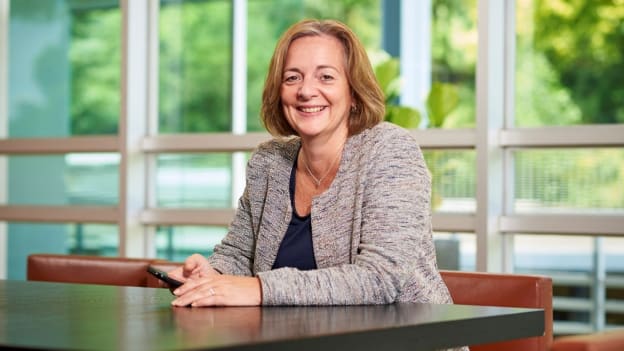DEI is a critical pillar of good governance: Digi’s Elisabeth Stene

Elisabeth Stene is a seasoned HR leader who joined Digi Telecommunications Sdn Bhd (Digi) as its Chief Human Resource Officer in 2018. She started her career in Telenor in a number of commercial roles before commencing her HR career in 2004, where she was later instrumental in promoting the organisational development agenda across the Group. Elisabeth is no stranger to Asia, and was with Uninor in India as the CHRO. She then returned to Telenor after six years in Multiconsult Group as Executive VP / CHRO, where she was responsible for end-to-end HR strategy and operations for the 3000-strong organisation.
In an exclusive interaction with People Matters, Stene shares key insights on enabling an impactful yet sustainable DEI strategy for the workforce and for the business at large along with strategies that leverage digital tools for furthering empowering diversity and inclusion. Here are some excerpts:
What are your top three DEI priorities for 2022?
Diversity, equity and inclusion (DEI) is ingrained in Digi’s strategy; it guides our behaviour, our way of work and how we conduct our business responsibly. For 2022, we want to build on top of that foundation.
The three things that we would focus on is firstly, to continue championing gender diversity, particularly focusing on post pandemic-related support initiatives. We are currently exploring a hybrid working model to provide more flexibility and support to parents to manage work and family obligations. We are also strengthening and developing our female leadership pipeline through continued coaching and mentorship.
Secondly, we will continue to advocate and prioritise DEI in our workplace. One recent action we have taken is to refresh our employer brand promise to include our DEI commitment to employees to attract and retain the right talents. Besides that, we will continue having open dialogues, multiple learning opportunities such as awareness sessions and summits for employees to elevate DEI across the organisation.
Our third focus will be to leverage our memberships and collaborations with global DEI champions like 30% Club Malaysia and UN’s Women’s Empowerment Principles to benchmark, share and learn from the best so that we can become better advocates, influence stakeholders, and encourage like-minded organisations to be onboard as well.
Do you see a shift in outlook towards DEI from the right thing to do to a business imperative? What are your thoughts on making DEI more impactful across the business?
We believe that businesses need to equally prioritise making tangible impact on the community alongside sustaining their bottom-line; it does not have to be just one or the other.
For us, DEI is a critical pillar of good governance. It is necessary for a business to achieve growth. Having people of different gender, age, culture, and capabilities at the table enable us to have a wealth of varied perspectives, skillsets and experiences. This results in creativity, innovation and better decision making for the business. It also helps us to understand our diverse customer base and serve them better. At the same time, it boosts the business by attracting the right talents and investors.
Through this, we have been able to reap the benefits of harnessing and growing our own talent internally. Every employee is given equal opportunity to develop their skills and grow to take on new challenges.
Particular to gender diversity, how do you see the role of men in enabling and accelerating gender equity?
Firstly, it is important to make sure that everyone is treated equally, and to create an environment where people are comfortable with sharing their feedback on issues on gender equality. “Walking the talk” is important, and men, beginning from the management level, must be intentional in breaking and removing biases in how they perceive talents in the organisation. Being a team player and supporting female colleagues by encouraging their perspectives and career development are ways that men can help create the environment for women to thrive in various capacities.
Throughout the years, Digi has been consistent in building company-wide awareness with a focus on building confidence in women to take on more responsibilities, and DEI is part of our agenda in management meetings and board updates.
What are some of the biggest challenges prolonging sustainable DEI? How can organisations overcome these?
When introducing and sustaining a new policy, framework or culture, there will always be challenges such as groupthink, resistance to change and ineffective decision making.
I firmly believe that a diverse and inclusive workforce at all levels of the organisation helps us maximise the power of different experiences. It begins with the leaders making intentional decisions to have the right policies and practices in place to champion DEI. This is done firstly by having Responsible Business as one of our core strategies, which among others is committed to providing an equal, engaged and empowered workplace for all. We also have a strict Code of Conduct that clearly prohibits discrimination at all levels.
Resistance to change can be addressed by showing stakeholders the benefits and positive impact of championing DEI, such as having an employee base mirroring our customer base enables us to serve them better and boost the business. Another benefit to call out is that DEI stimulates peer-learning from colleagues from diverse backgrounds and ensures that we are attracting high-performing talents.
Apart from this, Digi’s commitment to DEI is further strengthened through global recognitions received for our continuous efforts in this area - namely Bloomberg Gender-Equality Index, UN Women Asia-Pacific WEPs Awards, and Refinitiv Global Diversity and Inclusion Index.
Continuous awareness and learnings for all employees and leaders across the organisation especially with DEI-related courses helps them understand potential biases and ways to address them while fostering engagement and innovation at work.
With technology underpinning workplace accessibility for people with disabilities, how do you foresee inclusion becoming a reality? What can organisations do to overcome the social model of disability?
With the high availability and constant innovation of digital technologies for almost every aspect of our lives today, it is enabling greater accessibility for people with disabilities (PWD). At the workplace, the empowerment from remote working flexibility paired with cloud-based tools including virtual conferencing has now provided employers the opportunity to employ PWD talents and disable the social model of disability towards creating an organisation that is truly diverse and inclusive. As part of our Responsible Business commitment to make the internet equally accessible for all, some of our efforts include improving the accessibility features in our website and MyDigi app to better serve the visually impaired community in Malaysia.
With the advent of digital transformation, what steps can organisations take to implement D&I initiatives more effectively and measure their impact?
Having a robust employee engagement helps to drive DEI initiatives internally and gain better insights for improvement.
Investing in digital technology has helped us stay connected internally and enhanced employee engagement. Having the right tools and apps have opened opportunities for employees to have a more flexible way of work, learn new skills, smoother workflow and improve productivity. Employees are also able to chart their own growth with the equal opportunity and accessibility to online learning resources to upskill and reskill themselves. Digi has optimised digital platforms to carry out webinars, training and workshops online.
We also share key diversity statistics to Digi leaders to track representation, hiring and promotion outcomes, which enables impactful decision-making and promotes employee’s satisfaction.
While we continue these initiatives, it is also important to measure the impact. Digi regularly conducts company-wide surveys to obtain employee feedback on how these efforts are impacting them and how we can improve to support them better. When employees know that their feedback is heard and acted upon, they feel valued, satisfied, and have a powerful sense of belonging to their organisation. Through this we can build an empowered and inclusive workplace, which not just attracts diverse talents but also retains existing talents.














